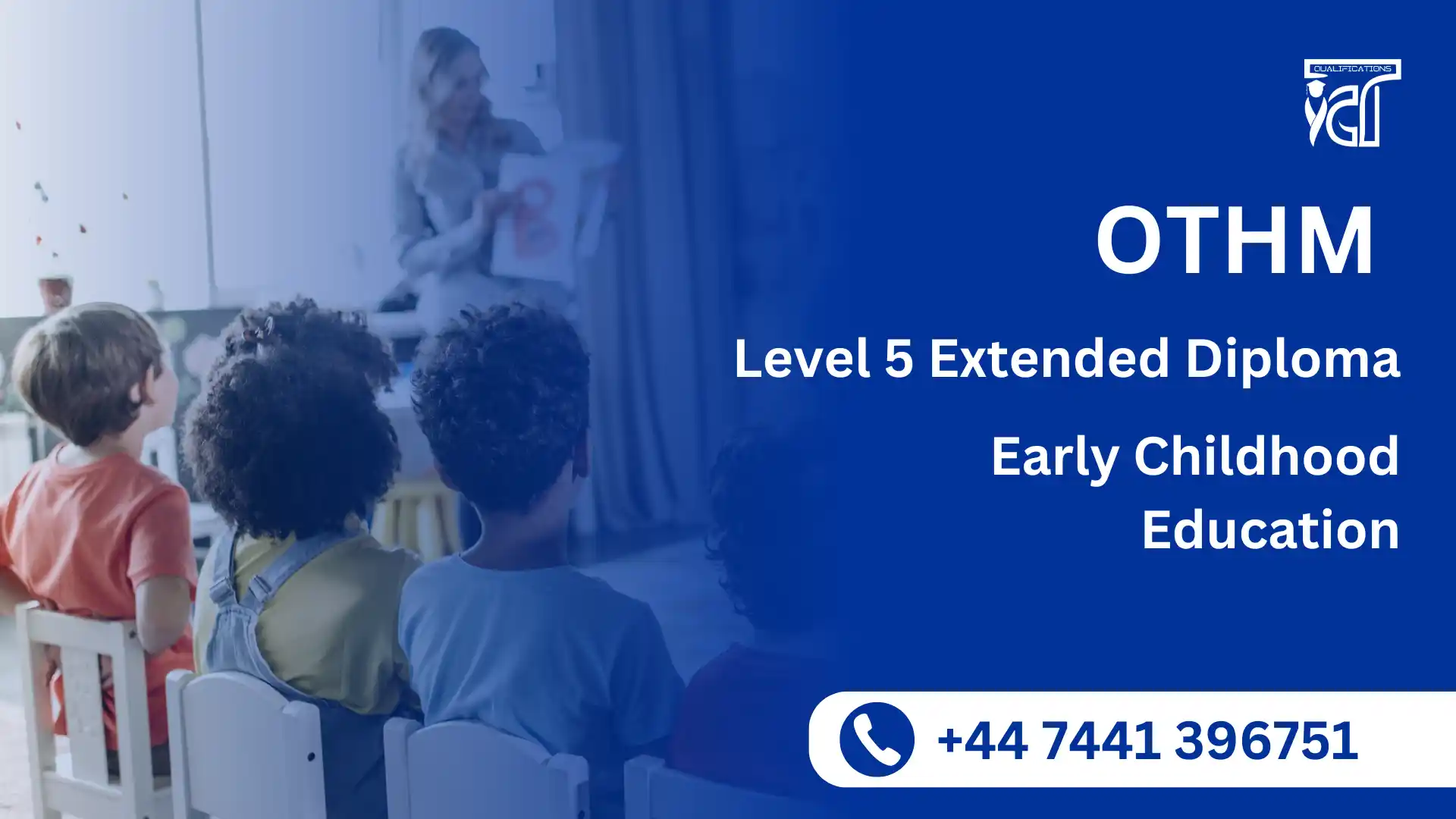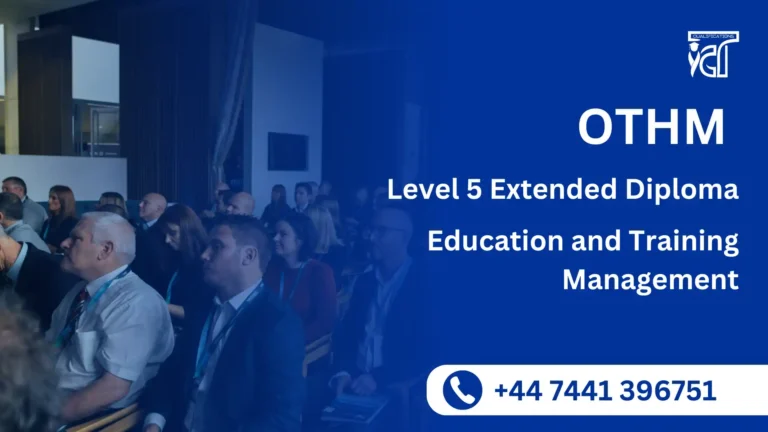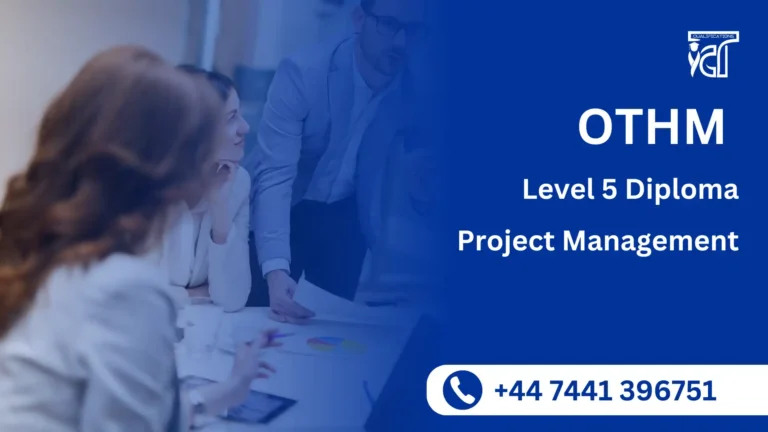In today’s evolving educational landscape, early childhood education is more important than ever. Laying the foundation for lifelong learning and development, early years practitioners play a vital role in shaping the social, emotional, and cognitive growth of children. The OTHM Level 4 and Level 5 Combined Diploma in Early Childhood Education offers an internationally recognised and Ofqual-regulated qualification designed for those who are passionate about working with young children and committed to professional excellence.
Whether you are beginning your career in early childhood education or looking to formalise your skills, this diploma provides a practical and academic pathway to gain essential knowledge, improve your practice, and progress to higher education or leadership roles.
The OTHM Level 4 and 5 Combined Diploma in Early Childhood Education is a comprehensive qualification that combines two levels of study into one programme. It provides learners with a strong theoretical foundation and practical insights into early childhood development, education policies, curriculum planning, and safeguarding practices.
Awarded by OTHM Qualifications and regulated by Ofqual (Office of Qualifications and Examinations Regulation, UK), the course is widely accepted by universities and employers across the globe. With 100% assignment-based assessment and flexible online learning options, it is suitable for full-time students, working professionals, and international learners.
This combined diploma covers 240 credits, equivalent to the first two years of an undergraduate degree in early childhood education or a related field. The curriculum is designed to enhance both academic understanding and hands-on application in early years settings.
The OTHM Level 4 and Level 5 Combined Diploma in Early Childhood Education provides the knowledge, confidence, and credentials needed to succeed in one of the most impactful fields in education. With a focus on real-world practice, academic development, and career progression, it is the perfect starting point for anyone passionate about shaping the next generation.
Enroll today and take your first step toward a rewarding and meaningful career in early childhood education.
OTHM Level 4 and Level 5 Combined Diploma in Early Childhood Education
The OTHM Level 5 Diploma qualifications reflect practical knowledge, skills, capabilities, and competencies that are academically recognized as equivalent to a Higher National Diploma (HND) and the second year of a three-year UK Bachelor’s degree program.
Mandatory units:
| Sr# | Unit Title | Credits | GLH |
|---|---|---|---|
| 1 | Academic Writing and Research Skills | 20 | 100 |
| 2 | Nurturing Growth and Development in Early Childhood | 20 | 100 |
| 3 | Fostering Collaborative and Inclusive Relationships in Early Childhood Setting | 20 | 100 |
| 4 | Learning and Development Through Play | 20 | 100 |
| 5 | Unlocking Words: Exploring Early Language and Communication | 20 | 100 |
| 6 | Early Personal, Social and Emotional Development | 20 | 100 |
| 7 | Exploring Early Years Pedagogy and Best Practices | 20 | 100 |
| 8 | Understanding Child Behaviour: Theoretical Perspectives and Insights | 20 | 100 |
| 9 | Inclusion and Diversity: Supporting Children with Special Needs and Disabilities in Early Education | 20 | 100 |
| 1 | Safeguarding; Child Protection and Keeping Children Safe | 20 | 100 |
| 11 | Emerging Literacies in the Early Years and Digital Resources | 20 | 100 |
| 12 | Understanding Transitions in Early Childhood | 20 | 100 |
GLH (Guided Learning Hours) and TQT (Total Qualification Time) are terms commonly used in vocational qualifications to help define the amount of time a learner is expected to spend on heir studies.
1. GLH (Guided Learning Hours)
GLH refers to the number of hours a learner spends being directly taught, supervised, or supported during their course. This includes the time spent in activities such as:
- Classroom instruction
- Practical workshops
- One-on-one tutoring or mentoring sessions
- Online learning sessions with tutor support
In other words, GLH represents the time that learners are actively engaged with their instructors or learning activities.
2. TQT (Total Qualification Time)
TQT represents the total amount of time a learner is expected to invest in completing a qualification, including:
- GLH (Guided Learning Hours): Time spent on direct learning, as explained above.
- Self-Directed Learning: This includes time spent on independent study, research, assignment completion, preparation for exams, and any other work the learner does outside of direct teaching hours.
TQT is a broader measure that includes all the time required to achieve the qualification. It helps learners and employers understand the overall commitment required for the qualification.
Key Differences Between GLH and TQT:
- GLH focuses on direct learning with guidance or supervision.
- TQT includes GLH as well as independent study time and other learning-related activities.
Example:
If a qualification has a TQT of 600 hours and a GLH of 250 hours, it means the learner should spend 250 hours in direct learning (classroom, online, or tutor-led sessions) and 350 hours on independent study or research.
Learning Outcomes of OTHM Level 4 and Level 5 Combined Diploma in Early Childhood Education
Academic Writing and Research Skills
- Understand the concept and purpose of academic research and writing.
- Understand how to conduct academic research.
- Be able to demonstrate critical thinking skills.
- Understand how to construct a reliable and valid academic argument.
Nurturing Growth and Development in Early Childhood
- Understand traditional and contemporary views and theories of growth and development
- Understand the role of reflexes and the role of the senses
- Understand locomotion
- Understand impacts of growth and development initiatives to support health and well being
- Understand traditional and contemporary views and theories of growth and development
Fostering Collaborative and Inclusive Relationships in Early Childhood Settings
- Understand the importance of promoting diversity, equality and inclusion
- Understand how to develop inclusive relationships through equality, diversity and anti-discriminatory practice.
- Understand barriers to parents being involved in their children’s early learning
Learning and Development Through Play
- Understand how play and learning activities promote children’s learning and development
- Understand curriculum approaches to outdoor play
- Understand how to support purposeful play
Unlocking Words: Exploring Early Language and Communication
- Understand the role of communication and language in children’s development
- Understand the development of communication and language
- Understand the critical periods of language development
Early Personal, Social and Emotional Development
- Understand different aspects of personal development
- Understand emotional development
- Understand social development
- Understand factors that might impact Personal Social and Emotional Development (PSED)
Exploring Early Years Pedagogy and Best Practices
- Understand the role of the pedagogue in supporting children’s learning and development
- Understand how to involve the family and the home learning environment
- Understand the concepts of making creativity part of the curriculum
- Understand the need to manage diversity and celebrate it within the curriculum
Understanding Child Behaviour: Theoretical Perspectives and Insights
- Understand theoretical perspectives of behavior
- Understand the social learning theory of child development
- Understand Vygotsky’s Sociocultural Theory
- Understand Bronfenbrenner’s Ecological Systems Theory
- Understand how factors such as parenting style; divorce and separation impact children’s behavior
Inclusion and Diversity: Supporting Children with Special Needs and Disabilities in Early Education
- Understand a wide range of special educational needs and disabilities
- Understand the principles of working inclusively with disabled children with specific requirements
- Understand how to work in partnership with parents and/or carers with disabled children with specific requirements
Safeguarding: Child Protection and Keeping Children Safe
- Understand current legislative frameworks and regulatory guidance
- Understand how to respond to allegations that a child has been abused or harmed
- Understand ways in which early years professionals can effectively contribute to safeguarding and keeping children safe
Emerging Literacies in the Early Years and Digital Resources
- Understand what emergent literacy is Understand the role of the adult in preparing children for reading
- Understand how to support children in making connections through early mark-making and writing development.
- Understand how to support children in making connections through early mark-making and writing development.
- Understand the use of digital resources to encourage reading
Understanding Transitions in Early Childhood
- Understand what ‘transition’ means
- Understand how transitions can be supported in the first 3 years of life.
Benefits – OTHM Level 4 and Level 5 Combined Diploma in Early Childhood Education
- Ofqual-Regulated and Internationally Recognised
This qualification is awarded by OTHM and regulated by Ofqual (UK), ensuring academic quality and global recognition from employers and universities. - Equivalent to Two Years of a UK University Degree
Offers 240 credits, equivalent to the first two years of a bachelor’s degree in early childhood education, allowing for direct progression to a final-year top-up degree. - 100% Assignment-Based Assessment
Learners are assessed through practical assignments and reflective coursework, avoiding the stress of traditional exams and promoting applied learning. - Career-Focused Curriculum
Covers essential topics such as child development, safeguarding, inclusive education, and curriculum planning—preparing learners for real-world roles in early years settings. - Flexible and Accessible Learning Options
Available through online and blended learning modes, making it ideal for both full-time students and working professionals. - Enhanced Employability
Equips learners with in-demand skills for careers as early years practitioners, nursery teachers, child development specialists, and more. - Supports Academic Progression
Graduates can advance to Level 6 or 7 diplomas, teacher training qualifications, or pursue a full undergraduate degree in Early Childhood Education or related fields. - Designed for Practical Impact
Focuses on both theoretical understanding and the development of hands-on skills needed to support children’s emotional, physical, and cognitive growth. - Professional Development Opportunities
Ideal for current childcare workers, assistants, and early years professionals seeking formal qualifications to grow in their careers. - Aligned with Industry Standards
Developed in accordance with UK early years frameworks and global best practices in early childhood education.
The OTHM Level 4 and Level 5 Combined Diploma in Early Childhood Education is designed for individuals who are passionate about working with young children and making a meaningful impact in the early years sector. This qualification is suitable for a broad range of learners, including:
- Aspiring Early Years Professionals
Individuals who want to start a career in early childhood education, childcare, or nursery teaching with a recognised UK qualification. - Current Childcare Workers
Practitioners and teaching assistants already working in nurseries, preschools, or early years settings who wish to gain formal qualifications to progress in their careers. - Career Changers
Individuals from non-education backgrounds who are looking to transition into a rewarding profession focused on child development and early learning. - School and College Graduates
Recent graduates who want an accessible, practical alternative to traditional university study and are eager to enter the education sector. - International Learners
Learners from around the world seeking a UK-regulated qualification that is widely accepted by employers and academic institutions globally. - Entrepreneurs and Childcare Business Owners
Those managing or planning to open childcare centres or nurseries and who want a deeper understanding of child development, education frameworks, and best practices.
Whether you’re beginning your journey in early education or looking to formalise and enhance your existing skills, this course offers the academic knowledge, practical training, and global recognition you need to succeed.
Entry Requirements
Register Now
Qualification Process
Qualification Process OTHM Level 4 and Level 5 Combined Diploma in Early Childhood Education
- Self-Assessment:
Begin by evaluating your eligibility to ensure you meet the qualification requirements, including work experience, knowledge, and language proficiency. - Registration:
Complete your registration by submitting the required documents, including a scanned copy of a valid ID, and paying the registration fee. - Induction:
An assessor will conduct an induction to confirm your eligibility for the course and explain the evidence requirements. If you do not meet the criteria, your registration will be canceled, and the fee will be refunded. - Assignments & Evidence Submission:
Provide all assignments and the necessary evidence based on the assessment criteria outlined in the course. If you are unsure of the required evidence, consult with the assessor for guidance on the type and nature of evidence needed. - Feedback and Revision:
The assessor will review your submitted evidence and provide feedback. Evidence that meets the criteria will be marked as “Criteria Met,” while any gaps will be identified. You will be asked to revise and resubmit if needed. - Competence Evidence:
Submit final evidence demonstrating that all learning outcomes have been met. This evidence will be marked as “Criteria Met” by the assessor once it is satisfactory. - Internal Quality Assurance (IQA):
The Internal Quality Assurance Verifier (IQA) will review your evidence to ensure consistency, quality, and compliance with standards. - External Verification:
The IQA will submit your portfolio to OTHM External Quality Assurance Versifier (EQA) for final confirmation. The EQA may contact you directly to verify the authenticity of your evidence. - Certification:
Upon successful completion of all checks, OTHM will issue your official certificate, confirming that you have attained the OTHM Level 4 and Level 5 Combined Diploma in Early Childhood Education.







